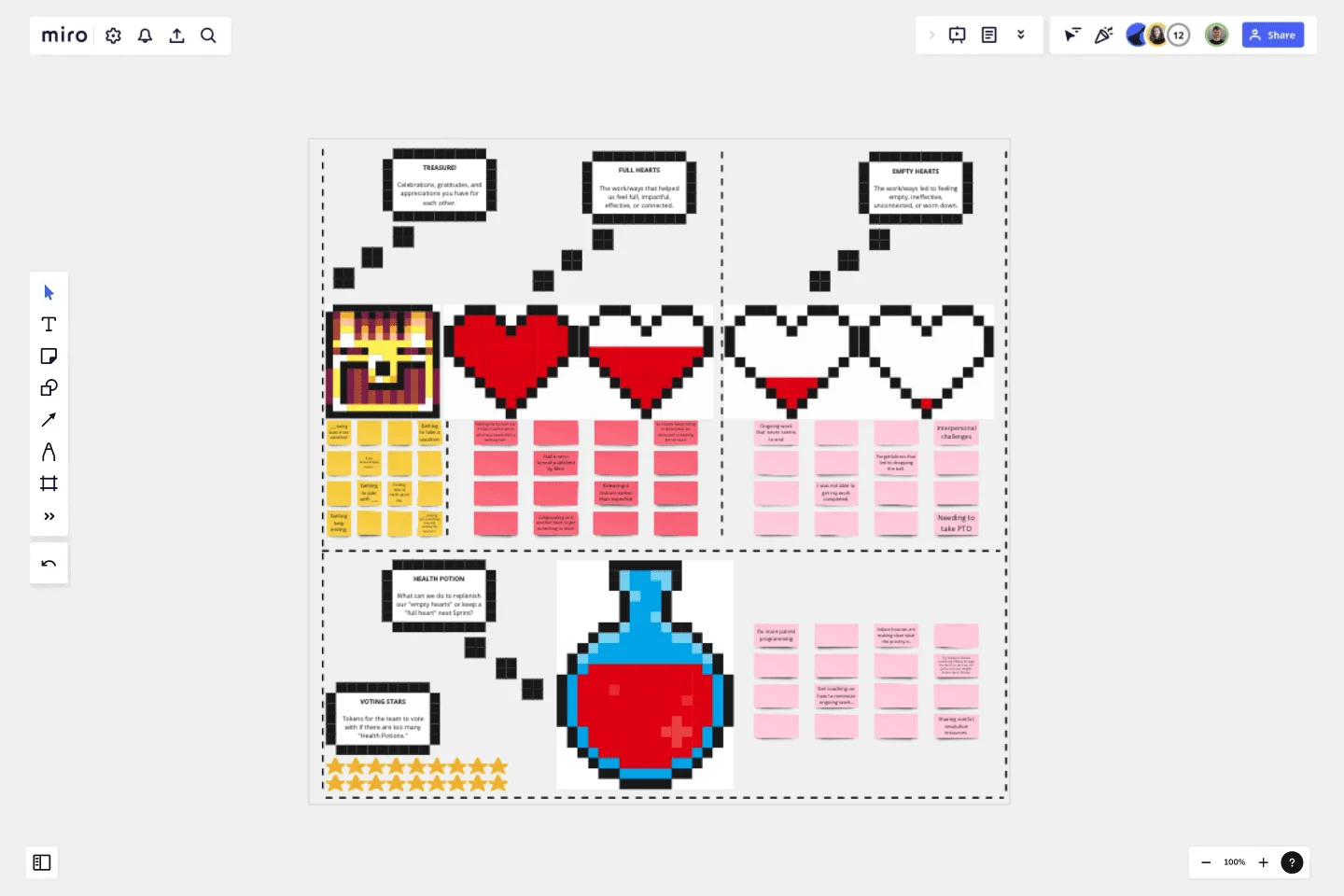8 Bit Hearts - A Retrospective
This 60-90 minute retrospective is inspired by retro games that used hearts to show how damaged or undamaged a player is.
In honor of 8-bit designs, all graphics used in this retro were made by using, coloring, and grouping square shapes directly in Miro.
The purpose of this retrospective is to identify ways this past Sprint our "hearts" were full or empty, impacting our ability to feel impactful in our roles, with our work, or with our interpersonal interactions; SO THAT we can understand how to promote "full hearts" next Sprint. By the end of the activity, your group should have at least one thing they can do as individuals or as a team to replenish their "hearts" for the next Sprint OR keep their hearts from depleting.
How to use this template
The template already contains all the elements you need to work with a team of up to 9 people. The retrospective will play out in four segments:
Intro: Review the purpose and outcome as a group. Describe each of the groupings participants will contribute to in step 2 (Treasure, Full Hearts, Empty Hearts).
Gather Data: Ask participants to contribute to the board.
Gather Insights: Facilitate an open conversation about the data.
Decide: Brainstorm what could be done next Sprint to replenish empty hearts or keep full hearts.
Tips
Enjoy the theme and use it to lighten the mood.
If you want to customize the color of images, you can use the grouped shapes in the TEMPLATE frame.
If you want to have just images and reduce load time, use the JPEG version of the images in the EXAMPLE frame.
This template was created by Cody Wanberg.
Get started with this template right now.
Project Retrospective
Works best for:
Retrospectives, Agile Methodology
The Project Retrospective template offers a structured approach for teams to review project performance and identify areas for enhancement. It provides elements for reflecting on project goals, milestones, successes, and challenges. This template enables teams to evaluate project outcomes, learn from experiences, and implement process improvements. By promoting reflection and accountability, the Project Retrospective empowers teams to optimize project delivery and drive continuous improvement effectively.
The 4-Step Retrospective
Works best for:
Retrospectives, Agile Methodology, Meetings
The 4-Step Retrospective template offers a simple yet effective framework for conducting retrospectives. It provides steps for reflecting on what went well, what didn't go well, what could be improved, and action planning. This template enables teams to systematically review past iterations, identify areas for growth, and implement actionable improvements. By promoting a structured approach to reflection and improvement, the 4-Step Retrospective empowers teams to drive continuous learning and enhancement effectively.
Design Sprint Retrogram
Works best for:
Agile, Retrospective
The Design Sprint Retrogram template facilitates retrospective sessions for Design Sprint teams to reflect on their experiences and identify improvement opportunities. It provides a structured framework for reviewing sprint outcomes, discussing what worked well, what didn't, and generating actionable insights. This template fosters a culture of continuous learning and refinement, empowering teams to enhance their sprint process and deliver better outcomes in subsequent sprints.
Rose, Bud, Thorn Template
Works best for:
Retros, Agile
The Rose, Bud, Thorn template is a structured method for team reflection and feedback, designed to help teams identify positive aspects, potential opportunities, and challenges within a project or situation. One key benefit of using this template is its ability to promote balanced feedback and productive discussions, which can lead to improved team processes and outcomes.
KWL Chart Template
Works best for:
Education, Brainstorming, Retrospectives
Sharing and learning new knowledge is the fuel in the tank of any ambitious team or organization. A KWL chart is a graphical organizer that powers the learning process. This easy template lets you design and use a KWL, with three columns: Know, Want to Know, and Learned. Then you and your team will fill in each column by following three steps: Take stock of what you know, document what you want to get out of your session, and finally, record what you’ve learned.
Reflection Island: End of Year Team Retro
Works best for:
Retrospectives, Agile Methodology, Meetings
The Reflection Island: End of Year Team Retro template offers a creative and themed approach to retrospectives, perfect for wrapping up the year. It provides elements for reflecting on achievements, challenges, and goals using a tropical island theme. This template enables teams to celebrate successes, learn from setbacks, and set intentions for the upcoming year in a relaxed and enjoyable atmosphere. By promoting reflection and celebration, the Reflection Island: End of Year Team Retro empowers teams to strengthen bonds, boost morale, and start the new year with renewed energy and focus effectively.
